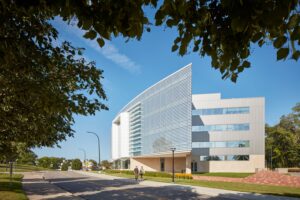
- Kim Kisner
- Community
- 06/13/2023
The Kresge Foundation Says, “It’s Critical That Businesses are Engaged in These Efforts”
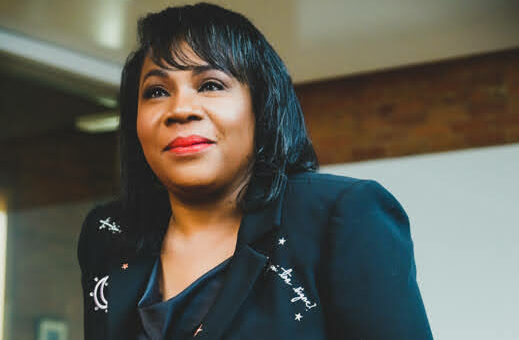
The Kresge Foundation in Detroit works to collaborate with cross-sector partners to promote and expand long-term, equitable opportunities in Kresge’s hometown through grantmaking and social investing.
As such, they are one of the largest funders of environmental work in the city and region.
This funding has gone to several of the programs and entities SBN Detroit has covered in our shared content. We spoke with Wendy Lewis Jackson, the managing director for Kresge’s Detroit Program, to get her perspective on the foundation’s impact in the Detroit area and specifically businesses in Southeast Michigan.
Jackson leads Kresge’s efforts to revitalize Detroit and strengthen its social and economic fabric. Her work supports organizations providing economic opportunity for low-income people and addresses the needs of vulnerable children and families.
Before joining Kresge in 2008, Wendy was a program director for Children and Family Initiatives and executive director for education initiatives at the Grand Rapids Community Foundation. She taught at Grand Valley State University and has co-authored and assisted in the publication of several reports and publications that address community needs and problem-solving.
Wendy earned a bachelor’s degree in political science and communications from the University of Michigan. She also holds a master’s degree in social work from U-M, with a concentration in community organization and social policy and planning.
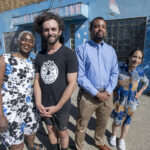
Q: The Kresge Foundation was founded in 1924 to promote human progress. How does that mission inform the Kresge Foundation’s work today?
A: The mission at that time was very broad, and since that time it’s been refined to include expanding opportunities in America’s cities with an emphasis on supporting families with low income. We now work in cities across the country. Detroit is our hometown and our signature place-based community. We have three other cities of focus and those are Memphis, New Orleans, and Fresno. But we are a national foundation deeply focused on place-based work in hundreds of cities.
Q: What are the shifts you’ve seen since started in this role in 2008 and how has the focus changed?
A: Our focus shifted starting in 2007 when our president Rip Rapson joined the foundation. Our north star changed from a philanthropy primarily focused on capital challenge grant campaigns for building projects across the country to programmatic grantmaking and social investing designed to ensure that people with low incomes have full access to economic and social opportunity in America’s cities. We now invest deeply in Detroit alongside six discipline-based foundation programs – health, community development, environment, arts and culture, human services, and higher education.
Q: What type of work are you doing in Detroit toward your environment focus?
A: In Detroit, we work citywide and in neighborhoods to advance economic equity, quality of life, and climate resilience for Detroiters so environmental justice and mitigating the impacts of climate change are a huge part of our portfolio. We support community-based groups and organizations to realize their goals when it comes to climate resilience. We also offer support for advocacy efforts within the state focused on ensuring greater environmental sustainability.
Q: What are some examples?
A: One of the largest examples involves our work in the Jefferson Chalmers community and the east side of the city. We recently announced the launch of a multimillion-dollar network of solar-powered resilience hubs on Detroit’s east side where residents can go for emergency services and support in times of flooding and other emergencies. The city of Detroit, Eastside Community Network, and Brilliant Detroit will have the first three hubs with more to be added later.
We are also working with Jefferson East Inc. and also the University of Michigan Sustainability Clinic on supporting their efforts to address flooding challenges and helping residents to mobilize and advocate for change.
Q: What do you think the Kresge Foundation’s impact is on the businesses in Southeast Michigan?
A: We hope that through our grantmaking and social investing we begin to raise awareness and possibilities for businesses to get engaged in projects that allow communities better access to improved solar, mobility, and more. One example of this is our partnership with the city of Detroit and DTE on the O’Shea Urban Solar Farm.
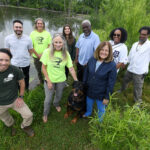
We don’t want Detroiters to be left behind in the movement toward climate resilience. Businesses in Southeast Michigan are poised to be leaders in the movement to address climate change. So, we are actively seeking opportunities to help businesses ensure that Detroiters have greater access to sustainability technologies and opportunities and make sure community-based groups are able to engage with businesses in these efforts.
Q: What are your efforts in sustainability as it pertains to jobs and workforce development in Southeast Michigan?
A: I’m glad you brought it up because our efforts are quite significant. A big focus is to make sure Detroiters have access to new and existing jobs in environmental sustainability and climate resilience.
We are looking to expand those opportunities now.
We supported workforce development efforts through a partnership with the Greening of Detroit. We also recently announced $1.7 million in grant funding for six projects that will benefit communities and wildlife habitats in southeast Michigan. Another example relates to the resilience hubs I mentioned. That project includes a business accelerator to engage Black and Brown contractors in the solar, battery storage, and electric vehicle infrastructure work.
Q: What do you think is the role of businesses in Southeast Michigan when it comes to sustainability?
A: They have a significant role. As I said, Detroit is in a good position to be a leader in climate resilience. Businesses here are in the process of bringing new and advanced technology toward these efforts and they must ensure all Detroiters have access. It’s critical that businesses are engaged in these efforts.
I’d like to share an open invitation to businesses in Southeast Michigan as we are open to partnerships that will ensure Detroit is climate-ready and climate-smart.
Q: In terms of this, what are the biggest opportunities?
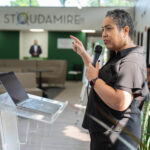
A: We have to look deeply into both the Infrastructure and Jobs Act as well as the Inflation Reduction Act. These are two significant federal funding opportunities to put Detroit on a greater path toward climate resilience. Businesses must be at the table as we think about maximizing our opportunities to access this federal funding that will improve the lives of the community.
Q: What does the future look like for the Kresge Foundation?
A: In 2024, we will celebrate our 100th Anniversary, so we will continue to be engaged in Detroit as well as expanding our work in other cities across the country. We have been fortunate to have a broad mission and that mission to expand opportunities for American cities will continue.
Be sure to subscribe to our newsletter for regular updates on sustainable business practices in and around Detroit.
Kim Kisner
- All
- Business
- Community
- Education
- Events

The Chip Bag Project, based in Detroit, is a sustainability initiative that upcycles hard-to-recycle snack packaging — particularly chip bags — into insulated sleeping bags for individuals experiencing homelessness. Founded by Eradajere Oleita, the project addresses both environmental waste and housing insecurity by transforming materials like Mylar into practical, thermally efficient solutions. In June, Oleita was among Trelllis’s 30 Under 30, its annual recognition of the brightest young...

PowerPanel, headquartered in Oxford, focuses on sustainable energy technology with a particular emphasis on hot water systems and thermal energy capture. The company designs and manufactures modular solar hybrid systems that integrate both photovoltaic and thermal components into a single unit. Its goal is to offer energy solutions that are more efficient, durable, and economically viable for a range of commercial and industrial applications. SBN Detroit interviewed Garth...

The Detroit VA Healthcare System is implementing a systemwide sustainability strategy through its Green Environmental Management System (GEMS), designed to reduce waste, lower energy consumption, and improve operational efficiency. The program recently earned Practice Greenhealth’s “Top 25 Environmental Excellence Award.” Through coordinated efforts across departments and a commitment to innovation—particularly in high-resource areas like dialysis—the Detroit VA works to demonstrate how environmental stewardship and clinical care can go...





